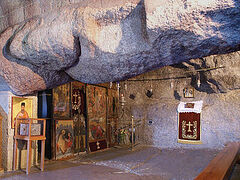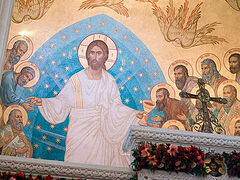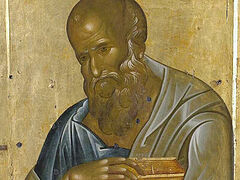Trust in God’s providence
The book of Revelation wasn’t written to satisfy our curiosity about coming events; not so we’d know whether Cyprus will be liberated, what will become of the Turks, what will happen to the rest of us. The book of Revelation was written to help us trust in Christ, to hope in Christ, and to know that Christ will prevail in the end, and that we’ll all inherit the Kingdom of God—that our goal is the Kingdom of God. But on the way there, we will undoubtedly encounter everything that Revelation gradually reveals through various images. Reading it, it’s not easy to understand what’s already happened, what will happen, and what is happening right now.
 Christ on a white horse, Philotheou Monastery, Mt. Athos
Christ on a white horse, Philotheou Monastery, Mt. Athos
We’re reading the third chapter, verse 7. Christ sends seven epistles to seven Churches through the Apostle John. We’ve already read five; there are two left.
Thy will be done
Christ tells St. John the Theologian: And to the angel of the Church in Philadelphia write; These things saith He that is holy, He that is true, He that hath the key of David, He that openeth, and no man shutteth; and shutteth, and no man openeth (Rev. 3:7). Here He addresses the bishop of the Church of Philadelphia. In these lines, Christ speaks of Himself, using epithets found in the Old Testament when it speaks about God. In the Old Testament, God is called holy, true, and “Amen.” This is another of the many proofs in Sacred Scripture that Christ is the true God Who spoke with the prophets in the Old Testament.
Only God is holy. We’re not holy—we become partakers of the holiness of God, each in proportion to his labors, to his purification from passions and sins. But only God can be called holy and true according to essence. Here it says that He Who is holy and true has the keys of David. May no one think that God has the keys to open and close certain doors. Here we’re talking about the power of the Holy Spirit, the power of the Divine Hypostasis. When God opens something, no one can close it. And when God closes something, no one can open it. This is very important for all of us to keep in mind.
We encounter such phenomena quite often: We try to do something, but it doesn’t work out. Or, on the contrary, circumstances develop in such a way that one door opens, a path opens in front of us that we hadn’t even asked for, hadn’t worked towards,and hadn’t even thought about it. But this path opens up and you go down it. This shows the will of God, which, of course, we all seek in our lives. We all say every day: “Thy will be done!” We ask God for His will to be done. Our heart, our whole being seeks the will of God, desires to be saved, to have communion with God—because the will of God is singular and one: our salvation. God directs everything towards our salvation, without violating our will, without violence against our essence, our identity.
“Guys, God didn’t leave us”
When something happens to us, it’s very important for us that God is there for us. When God is with us, then no one can do anything against us. Everyone may be against us, but in the end, whatever God blesses is what will happen. When God is with us, we’re not afraid of anything, we’re not afraid to fail. This isn’t just about our everyday affairs, which often can’t be dismissed as just vanity. It’s important for us to know about this for our own salvation.
Our elder, Geronda Joseph of Vatopedi of blessed memory, often told us:
Guys, God didn’t leave us when we didn’t know Him, when we insulted Him with our deeds, our words, our immoral life. Despite all that, God didn’t leave us. When we didn’t need Him, when we didn’t look for Him; when we pushed Him away, fled from Him, He remained with us, calling us to Him and doing everything to bring us nearer to Him, to bring us to the knowledge of His truth. And now, when we’ve come to know Him somewhat, when we’ve somewhat acquainted ourselves with Him and are clumsily seeking our salvation, even though our sins are so great that they prevent us from proving that we truly desire to be saved, we’re making some steps, more or less, compared to how we lived before. Is it really possible that God would abandon us now?
The Elder spoke this way to give us boldness and strength.
 Schemamonk Joseph of Vatopedi
Schemamonk Joseph of Vatopedi
Every man laboring in asceticism needs courage and strength, because we often encounter a wall of disappointment on our way: The passions don’t depart from us, the enemy fights us. A man feels like he’s not moving forward, he feels abandoned, he’s afraid he’ll lose, that he’ll hit rock bottom. At such moments, we need strength and patience, we need good thoughts to strengthen ourselves and not get lost. If God didn’t leave me then, will He really leave me now? It’s not possible that God would leave us. And if God is with me and desires my salvation, even though I’m in turmoil and tossing to and fro, God will win in the end. It’s enough for us to entreat the mercy of God, it’s enough not to leave God, not to leave our place, to not surrender ourselves into the hands of the enemy—into despair and hopelessness. No matter how many sins we commit, no matter how we pervert our lives, no matter what tragic situation we find ourselves in, nothing is difficult for God.
Nothing is impossible for God. We’ve already said that God can’t say: “I can’t do anything with this man. He’s committed so many sins and become so corrupted.” God doesn’t say that. There’s no situation that God can’t fix. Often, there are many things that you and I can’t do. Nothing is impossible for God. It will be enough for us to ask for God’s help, to pray that God will have mercy on us, to entreat God’s mercy.
“Every obstacle is for our good”
God has an infinite number of ways and means. He’s God—He’s not bound by anything; there are no boundaries for Him. God is unlimited in His energies; His power and possibilities have no limit. When God opens doors, no one can close them.
If it pleases God to do this and not that, no one can upset His plans. And when God closes a door, there’s nothing you can do; you won’t be able to open it. Our Elder also said: “If you knock on a door and it doesn’t open, don’t break it down.” Think about it—perhaps it’s for your good if God doesn’t open this door? You prayed, you tried, you did everything in your power, but you see things aren’t going your way. Your decision, your work, your attempt is left unresolved. Sit and think: “If I ask that it be done according to the will of God, if I ask God to help me, to support me, then why is this happening; why’s everything closed? Perhaps, after all, this is happening for my own good; maybe this is the way it’s supposed to be?” Quite often, that’s how it is. We’ve all had this experience, and our ancestors would say: “Every obstacle is for our good.”
Something is preventing you from doing your work. One thing doesn’t work out, then the next. Perhaps years later you’ll say: “Fortunately, all that didn’t work out for me then. It’s good that it didn’t go well then. How great it is that things didn’t work out then.”
Of course, when we ask for God’s mercy and help, we have trust in God. Try, do what you can, and leave the rest to God. So, God opens and no one can close; He closes and no one can open.
In verse 8, the Lord says: I know thy works: behold, I have set before thee an open door, and no man can shut it: for thou hast a little strength, and hast kept My word, and hast not denied My name (Rev. 3:8). I know your works; I acknowledge that you have worthy deeds. God tells the bishop that He has opened a door before him. “I left the door open for you to act with the help of the energy I gave you. And don’t be afraid—no one can shut this door. I know you have little strength, but still, you have kept My word and not renounced My name. You have remained faithful to My word.
Do you see how important it is for a man to remain faithful to God and to use what he has? However much you have—give it all to God, and God will multiply it, and use it for good. Even if you have no strength at all, at least give God your intention, your desire. Say: “You see, my God, that I can’t do anything. Where I’ve ended up, where my passions and sins have taken me, poor and wretched—I can’t do anything! But despite all this, I want to be saved.”
The saints said: “Give God your intention and receive power.” When you tell God: “I want to do this,” then the mighty God will give you His strength to do it, if the time has come. God expects our desire and will from us, for us to remain faithful to Him, to not reject the name of God.
There are many temptations, difficult periods, tragic hours in our lives when a man is ready to renounce even God. And don’t think that renouncing the name of God is saying: “God doesn’t exist; Christ doesn’t exist.” Not only that. Of course, that’s a renunciation—God forbid it should come to that. But we also renounce the name of God when we cohabitate with sin, when we compromise and say: “No worries, it doesn’t matter;” when we coldly transgress the commandments of God and justify our behavior saying we can’t live any other way, for various reasons, and we don’t repent of it; when we don’t at least say: “Okay, I’m breaking God’s commandments; I know I’m making a mistake; I’m upset about it. God, forgive me, I’m doing the wrong thing!” But when I justify myself, I say: “I’m not doing anything; the world’s not going to collapse. Look at others—they’re doing something more serious.” This means I’ll never repent.
A man who justifies himself will never repent. If you don’t understand that you’re making a mistake, how will you repent? If you have a justification for everything, how will you repent? How can grace enter the soul of a man who has no humility? In essence, a proud man is one who always justifies himself. A proud man, no matter what he has done, even murder, will always find a justification: “Of course I did it, but for this or that reason.” He doesn’t humble himself to ask forgiveness; he doesn’t admit his mistake; he doesn’t say: “I’m guilty. I’m a weak and passionate man.”
Two types of worship
Behold, I will make them of the synagogue of Satan, which say they are Jews, and are not, but do lie; behold, I will make them to come and worship before thy feet, and to know that I have loved thee (Rev. 3:9). If they were true Jews, the true people of God, they wouldn’t be liars; they wouldn’t be people who fight against the word of God, who crucified Christ and continue to crucify the people of God, the Church of Christ.
Further, the Lord says that He will make it so that these people come and worship at the feet of the bishop. Of course, it’s not to please him in some human way. The Lord will do this with the people from the satanic assembly so they would come and worship before the Church, would recognize the Church. Because the Church is the truth and Christ is the true God. And worship before thy feet is another argument for us in response to the heresies existing now that call people not to venerate icons. They say: “Only worship God!” Here Christ Himself says to the bishop: I will make them to come and worship before thy feet. What does this mean? Did God make the bishop an idol? Is Christ teaching us idolatry?
Worship varies. The worship that we give to God is one thing. We serve Him as the true God. To venerate icons or the saints as a sign of respect is another thing. We do this to express our respect for them; we worship in a relative sense—we don’t serve icons, we don’t say an icon is God; we kiss the image, the icon, on which Christ, the Theotokos, or the saints are depicted.
What is temptation?
Because thou hast kept the word of My patience, I also will keep thee from the hour of temptation, which shall come upon all the world, to try them that dwell upon the earth (Rev. 3:10). “You have kept My word; you have stayed true to it thanks to your patience for My sake.” You see, God doesn’t want His work to be easy. Easy things are cheap. Difficult things are costly. This bishop was a man of God who had boldness before the Lord, and he did his deeds with great forbearance. When does a man endure? When trials, sorrows, and hardships happen to him. This is the time of patience. When everything’s fine, when everything’s going well, when we have everything, when we’re not lacking anything, then we’re not enduring anything.
Sorrows, difficulties, confrontations, and conflicts are called temptations. They are things that tempts us, that tests us. The word “temptation” [πειρασμός in Greek], comes from the verb “πειράζομαι”—“something hurts me, worries me, brings me troubles.”1 A temptation is also a challenge. The word has many meanings.
Many think that a temptation is what inclines you towards sin,2 but it’s not only that. “Temptation” also means various difficult moments in our lives.
Thus, this man showed patience. You see, God doesn’t remove his temptations and sorrows. He leaves him where he is. He leaves this holy man—His man—to endure.
Some say that when they read about the torments, labors, trials, and struggles of the Apostle Paul and the other Holy Apostles in the Acts of the Apostles, they think: “Did these poor men really have so few trials: persecution, injustice, that they also had to get shipwrecked and lost for fourteen days, to wander in a boat among the raging sea, to wind up on an island? Why was all this necessary?”
 The Apostle Paul, El Greco. Early 17th C., Museo del Prado in Madrid
The Apostle Paul, El Greco. Early 17th C., Museo del Prado in Madrid
He was an Apostle, so he suffered much for God’s sake. The Lord permitted him to be tempted by all these troubles in order to be cleansed, sanctified, but most of all, so he could manifest the power of his love, because spiritual love possesses great power. This is why we see severe trials, one after the other, in the lives of the saints. You feel sorry for them on a human level and you wonder: “This poor man faced one hardship, then another. Isn’t that enough? Why did this have to happen too?”
But God doesn’t look at the temporary and fleeting. God looks at man and sees that he’s not for this life. This life will pass; maximum 100–120 years, and man departs. God prepares His children. As a good teacher prepares his students to pass their exams and go to college, so the good God prepares His Children to pass their exams and enter into His eternal Kingdom. Therefore, patience is required for a man to remain constant and firm in the word of God, to trust God, and to not be frightened by anything that happens (even catastrophes that make everything fly into the sky and tear apart). Let him not lose hope in God. Let him not think that God has forsaken him.
Further, the Lord says that He’ll preserve the bishop from the years of temptation that will come to the whole of creation to test those who live on earth.
Immediately after the book of Revelation was written, great trials began for the Church—the terrible persecutions of Domitian, Nero, and others. This affected all Christians, in all ends of the ecumene. Christians experienced very serious difficulties. There are preserved records that 11 million Christians were killed—11 million martyrs. They’re officially recorded in the martyrologies of the Church. Innocent blood was shed. For 400 years the Church was in the catacombs, amidst persecution. And later, all this was repeated, right up to the present day. Persecution is not only a hunt for a man to kill him, but also many other things. And here he talks about the terrible trials from which the Lord promised to save Him.




